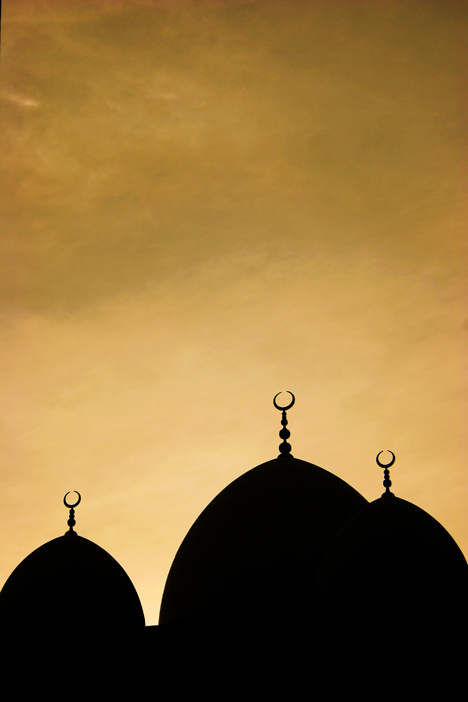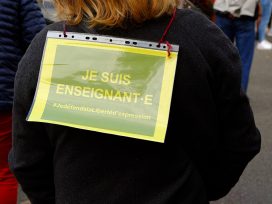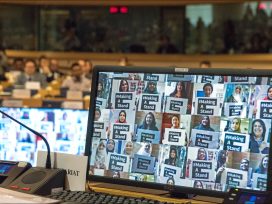Every year I give a lecture to a group of theology students – would-be Anglican priests, as it happens – on “Why I am an atheist”. Part of the talk is about values. And every year I get the same response: that without God, one can simply pick and choose about which values one accepts and which one doesn’t.
My response is to say: “Yes, that’s true. But it is true also of believers.” I point out to my students that in the Bible, Leviticus sanctifies slavery. It tells us that adulterers “shall be put to death”. According to Exodus, “thou shalt not suffer a witch to live”. And so on. Few modern day Christians would accept these norms. Others they would. In other words, they pick and choose.

Silhouette of a mosque in Dubai. Photo: BarryTuck. Source:Shutterstock
So do Muslims. Jihadi literalists, so-called “bridge builders” like Tariq Ramadan (“bridge-builder”, I know, is a meaningless phrase, and there are many other phrases that one could, and should, use to describe Ramadan) and liberals like Irshad Manji all read the same Qur’an. And each reads it differently, finding in it different views about women’s rights, homosexuality, apostasy, free speech and so on. Each picks and chooses the values that they consider to be Islamic.
I’m making this point because it’s one not just for believers to think about, but for humanists and atheists too. There is a tendency for humanists and atheists to read religions, and Islam in particular, as literally as fundamentalists do; to ignore the fact that what believers do is interpret the same text a hundred different ways. Different religions clearly have different theologies, different beliefs, different values. Islam is different from Christianity is different from Buddhism. What is important, however, is not simply what a particular Holy Book, or sacred texts, say, but how people interpret those texts.
The relationship between religion, interpretation, identity and politics can be complex. We can see this if we look at Myanmar and Sri Lanka where Buddhists – whom many people, not least humanists and atheists, take to be symbols of peace and harmony – are organizing vicious pogroms against Muslims, pogroms led by monks who justify the violence using religious texts. Few would insist that there is something inherent in Buddhism that has led to the violence. Rather, most people would recognize that the anti-Muslim violence has its roots in the political struggles that have engulfed the two nations. The importance of Buddhism in the conflicts in Myanmar and Sri Lanka is not that the tenets of faith are responsible for the pogroms, but that those bent on confrontation have adopted the garb of religion as a means of gaining a constituency and justifying their actions. The “Buddhist fundamentalism” of groups such as the 969 movement, or of monks such as Wirathu, who calls himself the “Burmese bin Laden”, says less about Buddhism than about the fractured and fraught politics of Myanmar and Sri Lanka.
And yet, few apply the same reasoning to conflicts involving Islam. When it comes to Islam, and to the barbaric actions of groups such as ISIS or the Taliban, there is a widespread perception that the problem, unlike with Buddhism, lies in the faith itself. Religion does, of course, play a role in many confrontations involving Islam. The tenets of Islam are very different from those of Buddhism. Nevertheless, many conflicts involving Islam have, like the confrontations in Myanmar and Sri Lanka, complex social and political roots, as groups vying for political power have exploited religion and religious identities to exercise power, impose control and win support. The role of religion in these conflicts is often less in creating the tensions than in helping establish the chauvinist identities through which certain groups are demonized and one’s own actions justified. Or, to put it another way, the significance of religion lies less in a given set of values or beliefs than in the insistence that such values or beliefs – whatever they are – are mandated by God.
And it is in this context we need to think about whether there is “something about Islam”. There are a host of different views that Muslims hold on issues from apostasy to free speech, views that range from the liberal to the reactionary. The trouble is that policymakers and commentators, particularly in the West, often take the most reactionary views to be the most authentic stance, in a way they would rarely do with Buddhism or Judaism or Christianity.
The Danish MP Naser Khader once told me of a conversation with Toger Seidenfaden, editor of Politiken, a left-wing Danish newspaper that was highly critical of the Danish cartoons. “He said to me that cartoons insulted all Muslims”, Khader recalled. “I said I was not insulted. And he said, ‘But you’re not a real Muslim’.”
“You’re not a real Muslim.” Why? Because to be proper Muslim is, from such a perspective, to be reactionary, to find the Danish cartoons offensive. Anyone who isn’t reactionary or offended is by definition not a proper Muslim. Here leftwing “anti-racism” meets rightwing anti-Muslim bigotry. For many leftwing anti-racists, opposing bigotry means accepting reactionary ideas as authentically Muslim. For many rightwing bigots (and, indeed, for many leftwing bigots, too), there is something about Islam that makes it irredeemably violent, even evil, and that makes all Muslims potentially dangerous.
Here also, liberal so-called anti-racism becomes a vehicle for buttressing the most reactionary, conservative voices in Muslim communities and for marginalizing the progressive. It becomes a means of closing down debate, censoring criticism, and giving power and legitimacy to “community leaders’ spouting the most backward of views. “The controversy over the cartoons”, as Naser Khader observed, “was not about Muhammad. It was about who should represent Muslims. What I find really offensive is that journalists and politicians see the fundamentalists as the real Muslims.” Which is why many Muslims, ironically, often have more liberal views on free speech than many so-called liberal non-believers.
The real problem, then, is not simply Islam as such. Nor is it even simply the conservative strands of Islam, though such strands clearly embody odious views, are often viciously intolerant, and, where they give rise to movements such as the Taliban or ISIS, can be demonically inhuman. The problem is also the attitudes of non-Muslim commentators, policymakers and activists, both liberals and bigots, as to what constitutes an authentic Muslim, the failure to see beyond the conservative or the reactionary as the true Muslim, the inability to distinguish between the faith of ordinary believers and the politicised use of faith for reactionary ends by power-grabbing, control-seeking individuals and organizations. The problem is also government policy, particularly in the West. Policy makers have all too often treated minority communities as if each was a distinct, homogeneous whole, each composed of people all speaking with a single voice, each defined primarily by a singular view of culture and faith. They have ignored the diversity within those communities and taken the most conservative, reactionary figures to be the authentic voices.
And worse, the problem lies also in the attempts by governments to encourage reactionary religious forces to act as counterweights to radical opposition, often with disastrous consequences. There is, for instance, a terrible irony in Israel’s current assault on Gaza. It was Israel itself that helped Hamas to power in the first place, viewing radical Islamism as a useful tool with which to counter the influence of the secular PLO. Cynical it may have been, but there was nothing exceptional about such policy. Many governments, western and non-western, have pursued similar strategies, strategies that have consistently strengthened the hand of the reactionaries against the progressives: from Egypt in the 1970s looking to the Muslim Brotherhood to keep the radical left opposition in check; to America helping fund and arm jihadis in Afghanistan; to even the French government, which supposedly disdains “Anglo-Saxon communalism”, encouraging communal Islamic identity when it has proved politically expedient. Valéry Giscard d’Estaing’s government, for instance, faced with a series of major strikes involving mainly North African workers, encouraging the building of prayer rooms in factories, because in the words of immigration minister Paul Dijoud, “Islam is a stabilizing force which would turn the faithful from deviance, delinquency or membership of unions or revolutionary parties.”
So, yes there is something about Islam that needs challenging. But equally, there is something about secular liberalism, and the blindness and pusillanimity of many secular liberals, the bigotry of many critics of Islam, and the cynicism of many secular governments in their exploitation of radical Islam, that needs challenging too.
This is a transcript of Kenan Malik’s introductory comments at the panel discussion “Is there something about Islam?” at the World Humanist Congress on 9 August 2014.







